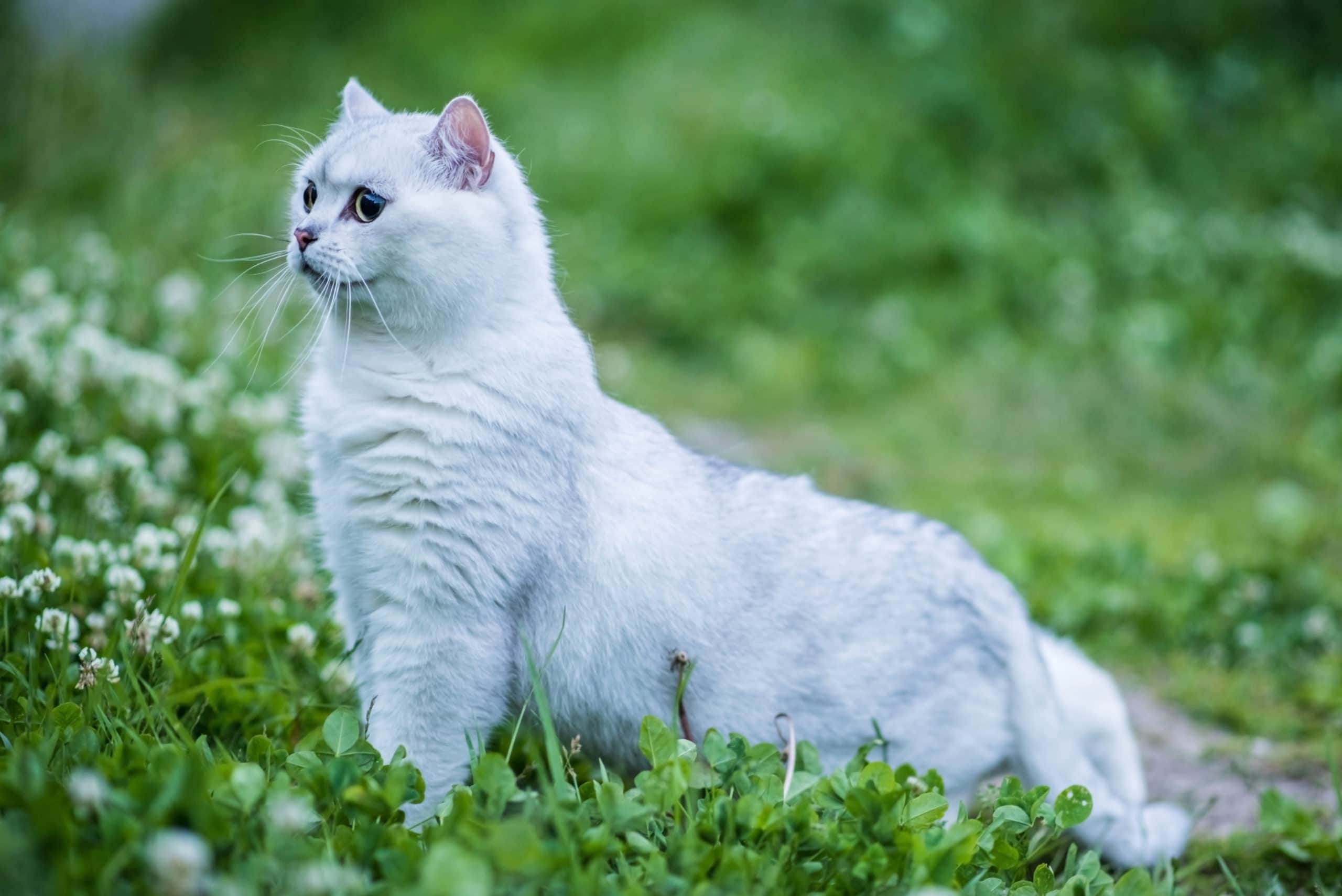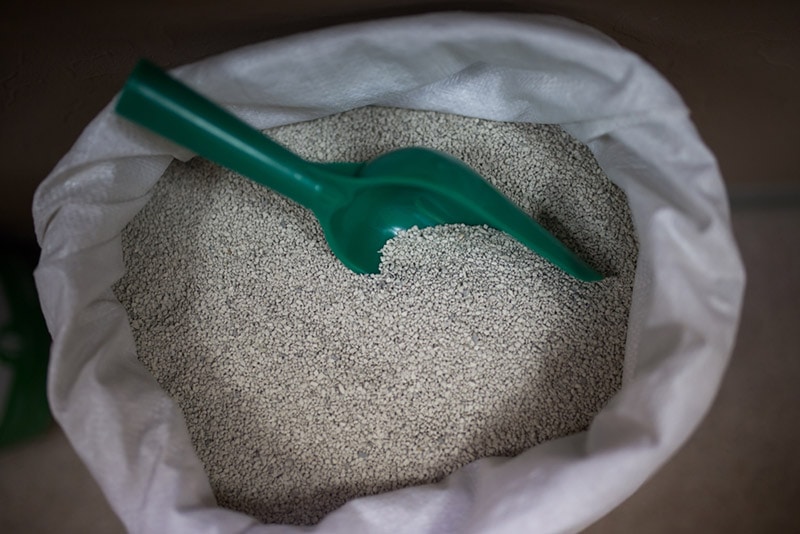Why Do Cats Pant? 4 Possible Reasons & What You Can Do

Updated on
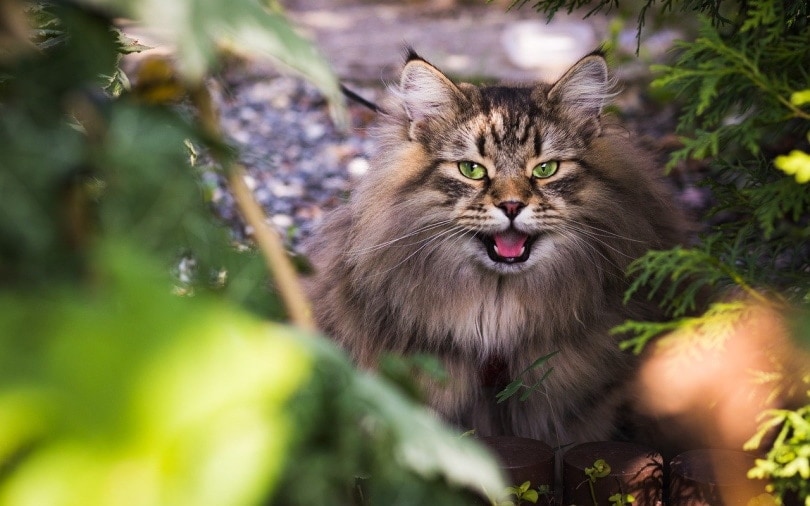
Unlike dogs, cats do not commonly pant to keep themselves cool. Under normal circumstances, a cat’s breathing should be smooth and unlabored. When cats pant, they breathe with their mouths open and their tongues sticking out, taking frequent breaths with greater effort. Panting can be normal in cats in some circumstances, but it is often a sign that something more serious is going on.
 The 4 Main Causes Of Panting In Cats
The 4 Main Causes Of Panting In Cats
When a cat pants, it can be a sign of overheating or overexertion, stress, or that they are suffering from a serious illness that needs urgent veterinary attention. We’ll help you decipher how to respond to this somewhat unsettling behavior below.
1. Overheating And Overexertion
Cats sometimes pant to release heat, but they will only use this method of thermoregulation when they are extremely heat-stressed. Panting is not a cat’s preferred way to stay cool. Cats usually stay cool by lying in the shade or against a cool object and not overexerting themselves on a hot day. Cats also cool themselves down by grooming their coats and allowing the saliva to evaporate and cool the surface of their bodies. This strategy can be likened to sweating in people. Cats do have sweat glands, most of which are found in the paws, but they are insufficient to cool down their bodies. Cats may also pant after overexerting themselves from heavy play.
If you see your cat panting on a hot day, immediately move him or her to a cool area. Offer cool water with ice blocks but don’t force your cat to drink. If a round of heavy play has resulted in your cat panting, calmly break up or end the game and move your cat to an area in which they can relax. Your cat should stop panting within 5 minutes once they have cooled down. If the panting continues, it is time to seek veterinary care.
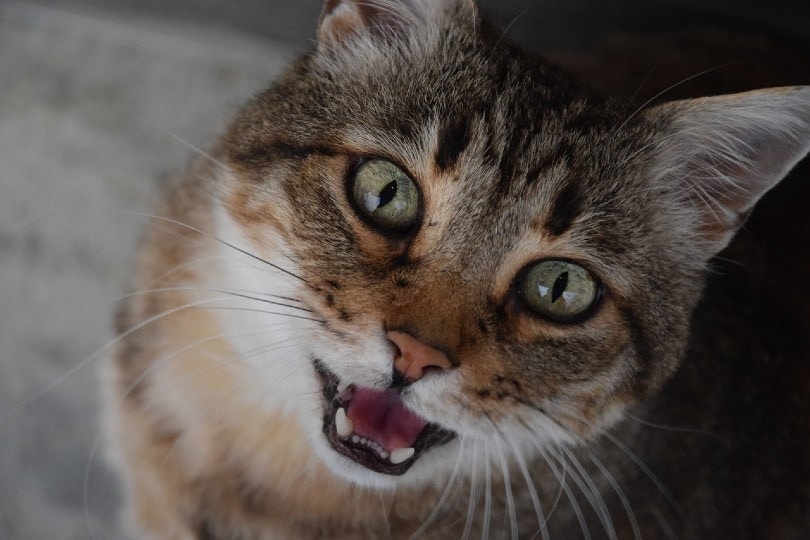
2. Stress
Cats sometimes pant when they are stressed. A trip in a cat carrier, car rides, or a visit to the vet are some of the common stressful situations that may result in your cat panting. Always keep your cat as cool as possible during car rides by positioning the cat carrier close to air conditioning vents. Only drive with your cat in the car when necessary and keep car rides as short as possible to minimize stress.
If visits to the vet clinic are a cause of stress for your cat, discuss this with your veterinarian. Your vet may prescribe calming medication which you can give to your cat prior to the visit. Most vets are also happy to make arrangements for your cat to be moved to a quiet area while waiting for their appointment.
Your cat should stop panting once they are taken out of the stressful situation and allowed to calm down. As mentioned before, if your cat continues to pant after being removed from such an environment, you should seek immediate veterinary attention.
3. Illness
There are many serious diseases that may cause panting in cats, with heart disease and respiratory disease being two of the most commonly encountered illnesses. Panting caused by a medical condition usually arises without an obvious trigger such as overheating or stress. This type of panting usually does not resolve quickly once the cat has cooled down or the stressor has been removed.
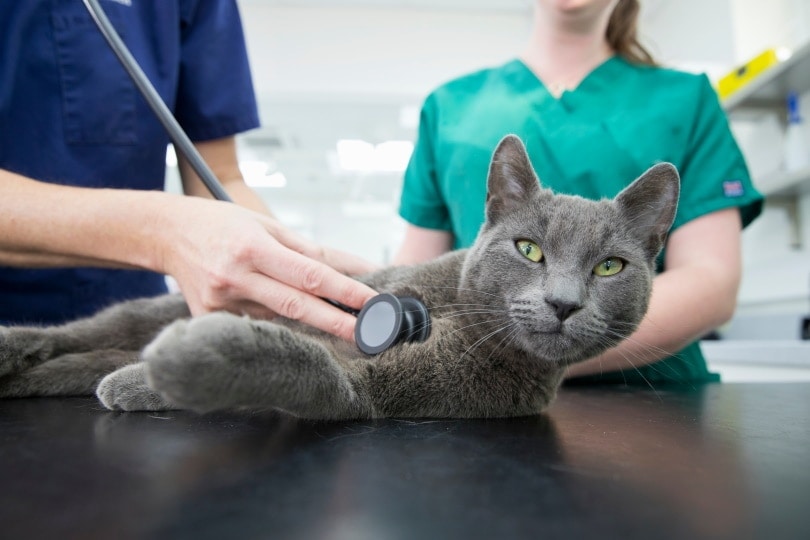
4. Heart Disease
Heart disease affects both kittens and older cats although it is most commonly seen in adult cats. According to the Cornell University School of Veterinary Medicine, the most common type of heart disease affecting adult cats is cardiomyopathy. This disease accounts for two-thirds of all diagnosed adult feline heart disorders.
Cats tend to hide signs of early heart disease and will often only show clinical signs once the disease is advanced. Unlike dogs and people, heart disease does not commonly cause coughing in cats. Panting along with weight loss, lethargy, collapse, and sudden hind leg paralysis are common signs of heart disease in cats.
If your cat is showing any of these signs, contact your vet immediately. Panting caused by heart disease is a medical emergency.
If you need to speak with a vet right now but can’t get to one, head over to JustAnswer. It’s an online service where you can talk to a vet in real time and get the personalized advice you need for your pet — all at an affordable price!
Respiratory Disease
Respiratory disease can be divided into upper and lower respiratory disorders. The upper respiratory tract in cats is made up of the nasal passages, sinuses, oral cavity, the pharynx, and the larynx. Upper respiratory disease may be caused by viruses (such as herpesvirus and calicivirus causing snuffles), bacterial infections, fungal infections, nasal polyps, or tumors. Symptoms of an upper respiratory issue include a discharge from the eyes or nose, sneezing, conjunctivitis, oral ulcers, and loss of appetite. Cats with upper respiratory disease may appear to be congested or “blocked up” and will struggle to breathe through their noses. This congestion may cause them to open their mouth to breathe or pant in order to take in air.
A cat’s lower respiratory tract is made up of the trachea, bronchi, and lungs. Feline asthma and chronic bronchitis are considered the most common lower respiratory tract diseases in cats. According to the Clinician’s Brief, 0.75% to 1% of the feline population may be affected by bronchitis and asthma. The symptoms of lower respiratory disease include coughing, lethargy, a loss of appetite and labored breathing or panting. If a cat is severely deprived of oxygen, their gums and tongue may even turn blue. This is a life-threatening situation.
If your cat is showing any of the symptoms of upper or lower respiratory disease, your veterinarian should be consulted immediately.
Other Illnesses That May Cause Panting
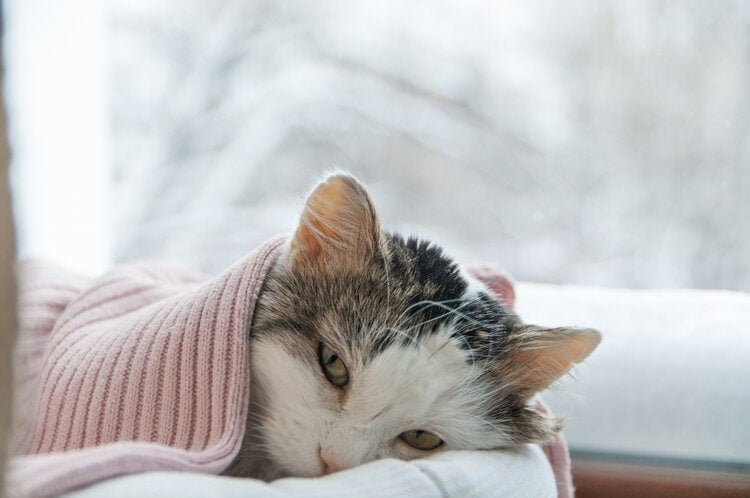
Other medical conditions that may cause panting in cats are tumors, trauma, pain, and anemia, all of which may be life-threatening if not treated urgently.
In an emergency situation where your cat is panting due to an inability to breathe, your vet will want to administer oxygen and stabilize your pet with emergency drugs. Your veterinarian may also want to run blood tests, take X-rays of your cat’s chest and abdomen, or perform an ultrasound or echocardiogram to figure out what is going on.
 Final Thoughts
Final Thoughts
Panting in cats is usually a sign that something isn’t right. Panting due to causes other than overheating, overexertion, or stress, can be life-threatening and require urgent veterinary attention. A panting cat should always be monitored closely and should never be left alone. If the panting does not subside within 5 minutes after moving your cat to a cool, stress-free area, you should seek urgent veterinary care for your cat.
See also:
Featured Image Credit: Sunykiller, Pixabay
 The 4 Main Causes Of Panting In Cats
The 4 Main Causes Of Panting In Cats
